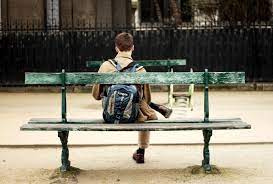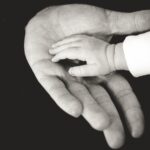An old Honda with a bumping bass pulls up to my curb. My heart sinks—I’ve been hoping my grown live-in son stays away from a certain element. It’s only been ten “clean” days, but I hope he makes it through another day. The one who sells what my son’s too often needed sits outside waiting, motor idling, dark tinted windows shielding his identity.
I wait, too. And silently pass judgment on this guy in the Honda. If only he’d stay away, my son wouldn’t be tempted. If only my son hadn’t run with the wrong crowd, none of this would’ve happened.
That’s what I tell myself. I set my jaw, wishing I could fly outside and shoo away the interloper, like a mother scarecrow protecting the crops. Instead, I stand in my kitchen, questioning myself. Would my kid really be fine if it weren’t for these bad influences? This wrong crowd? Who are they and how did they come to be viewed as “bad?”
My middle son was in sixth grade when he began to act out. He was terrified of middle school. Once when he refused to attend, his father and a male friend tried to carry him, kicking and screaming to the school. He ran back home. Nothing helped: not Sunday School, not Scouts, not Family Night. From then on, he was privately tutored. He made some new friends.
Later, I’d learn that by then he was experimenting with alcohol, marijuana and meth. I immediately blamed his behavior problems on these new friends. But his substance use problems grew. Now in his forties, he tries to kick meth a few days at a time.
I’ve read about and heard from so many parents who attribute their child’s problems with substances to “falling in with the wrong crowd.” I too have bought into that idea. But is it really true?
I don’t know about other families who struggle with a child’s addiction. Maybe other families really can steer their kids away from chronic use by making sure they have wholesome activities and well-supervised friends. All I know is that I once laid blame at the feet of those bad kids. Now I wonder if other parents told their kids to stay away from my son.
Or, maybe there are no bad kids. Some children (and adults) do bad things. When kids are minors, it makes sense to try to keep them engaged in activities and steer them toward peers with a lot of adult supervision.
Yet maybe those who veer off the accepted path have deep and meaningful reasons. Those with mental illness and substance use disorder do what they do because it fills a need. Very few long-time users are in it to make people shun them. But when they are shunned, shamed and rejected, these people may not be welcomed anywhere but in Badkidville.

There are no bad kids.
So they wind up on a school’s Smoker’s Corner, or hang with fellow rejects. If a person is already dependent on a substance, why would they associate with people who condemn what they can’t stop doing?
The Honda’s bass bumps louder. Anxiety creeps up my spine like the crazed glass of my phone’s cracked screen. I could call the law—that thumper outside would be gone in a flash. My fingers itch to get this guy outside in trouble. He’s probably already on parole anyway. I’ll fix it so he can’t bother us again.
But here comes my son. He’s got bed hair and his face is full of sleep. To a mom of a meth user, it’s a picture of heaven. His cheeks aren’t sunken. He’s gained a little weight. I hold my breath.
He smiles. “Hey, Mom.”
My gaze darts to the window, then to him. He just smiles again and says he’s going back to bed.
Something in me opens, a winter blossom on a freezing day. He’s not bad. He made his own decision. Like me, sometimes he opts for the wrong path. When he can’t withstand the urges, he suffers and joins the wrong crowd for a time. But then he reinflates hope, gets up and tries again. And his hope renews mine.
I imagine those who’ve been judged as wrong or bad or loser. I picture my heart, growing and grow in order to love them all.
The bumping outside fades as the Honda drives off. In my mind I’m running behind that car, offering peace. Instead of a fist I hold up an outstretched hand.





